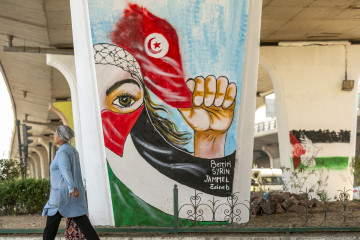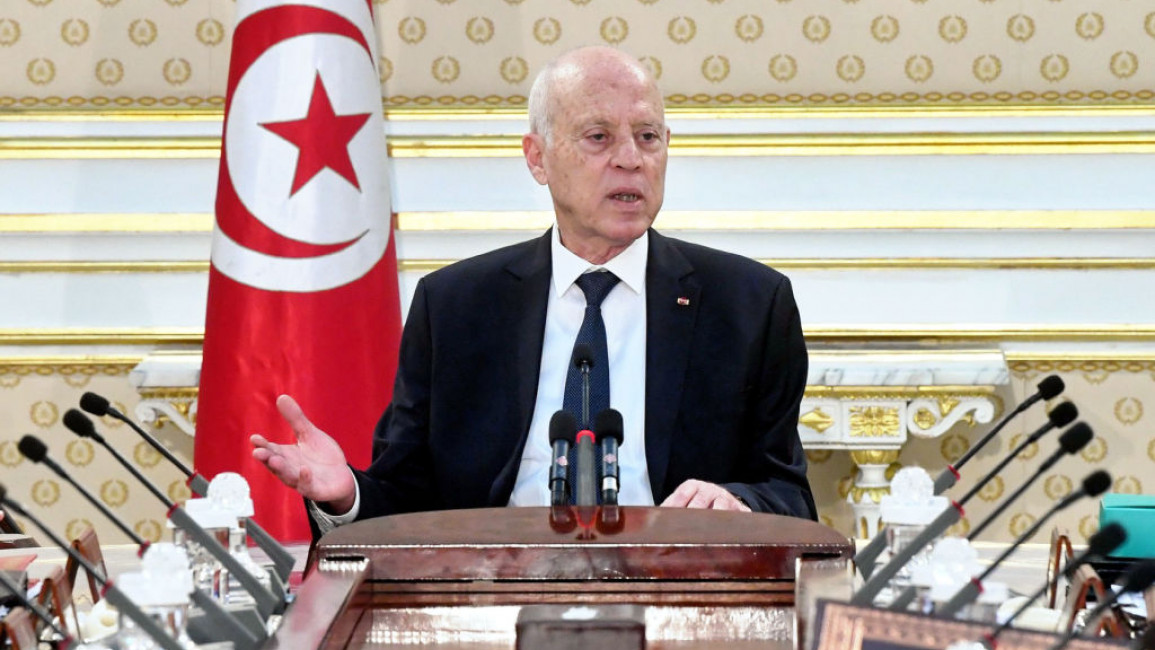
The anti-Israel law dividing Saied and Tunisia's parliament

On 2 November, the Tunisian Assembly of People was stunned into silence and confusion when a letter from President Kais Saied interrupted a voting session on the anti-normalisation law with Israel to instruct members to dismiss the bill.
“The President told me to inform you to postpone the session because the proposed law endangers Tunisia’s external security and interests,” the head of the People’s Assembly Ibrahim Boudarbala told the session, telling the representatives they could do with the president’s opinion “whatever they want”.
Saied’s letter divided his parliament for the first time since its election last year.
After an hour-long brouhaha, the head of the assembly announced the postponement of voting until the next day.
However, two weeks later, the postponed session has still not taken place as many unanswered questions remain concerning Saied’s position vis-à-vis Israel and the danger of criminalising ties with Tel Aviv.
"Kais Saied interrupted a voting session on the anti-normalisation law with Israel to instruct members to dismiss the bill"
Why is Saied against the anti-normalisation bill?
The controversial draft bill, first presented to the parliament in July, includes seven chapters that criminalise trade, communication or any form of cooperation or mediation with Israel.
Amid the Israeli war on Gaza, 97 representatives requested its urgent consideration, and accordingly, the Parliamentarian Committee on Rights and Freedoms has worked to expedite its discussion and study.
The draft suggests a punishment of life in prison for "the crimes of espionage, supporting the Zionist enemy, and carrying weapons against the Palestinians, along with the crime of placing oneself at the mercy of the Zionist entity".
Meanwhile, penalties for “normalisation crimes” range from 6 to 12 years, and a fine of up to 100,000 dinars ($31,482).
In recent months, several reports have suggested a potential normalisation deal between Tel Aviv and Tunis as Israel endeavours to widen its influence in North Africa.
However, President Kais Saied has ruled out, on multiple occasions, any chance of establishing diplomatic ties with Israel.
"The word normalisation does not exist for me when it comes to Israel," said Saied in a speech in August.
That’s why his letter to the Assembly did not make much sense to his supporters or opponents.
“Normalisation should be punished because the Palestinian cause is a priority and it comes first before everything else,” Khalifa, a 56-year-old retired employee and supporter of Kais Saied’s ‘exceptional measures’ of 2021, told The New Arab.
|
|
“He is under pressure from foreign powers,” he added, a theory that some Tunisian MPs have also promoted.
Mohamed Ali, an MP and the rapporteur for the Rights and Freedoms Committee (responsible for examining the bill before it went to the plenary session) has claimed that Washington had threatened "economic and military sanctions" if the bill were passed.
In his defence, Saied presented an analogy bordering on mental gymnastics, arguing that since he does not acknowledge the concept of normalisation it would be counter-productive to discuss any law regarding it.
He added that Tunisia already has a law (Article 60 of the Penal Code) that stipulates the death penalty for any Tunisian found guilty of communicating intelligence with a foreign power.
The foreign minister, Nabil Ammar, has also deemed the discourse about the anti-normalisation law redundant considering Tunis has no ties with Tel Aviv.
But, for the first time since Saied’s ‘constitutional coup’, several of his opponents are relieved by his stance because, they argue, the bill could have been extremely dangerous for Tunisians abroad and NGO activists.
"The controversial draft bill, first presented to the parliament in July, includes seven chapters that criminalise trade, communication or any form of cooperation or mediation with Israel"
'Show me your passport'
“I can’t ask people to show me their passports before I talk to them. This is madness,” Amna, a Tunisian activist working for a foreign NGO, told TNA.
The anti-normalisation law criminalises contact or communication with Israeli passport holders. This means that every interaction with someone who happens to be an Israeli citizen could be prosecuted as treason.
This would include, for example, Tunisian professors who teach abroad and may have students who happen to have Israeli passports, NGO activists, or political experts who attend international summits and may happen to be part of a conference that includes Israeli passport holders. It would also ban all communication with Palestinians who carry Israeli passports.
The bill did not specify if certain exceptions would be granted to Tunisian politicians and diplomats.
“This will lead to the isolation of Tunisians living abroad and further the discrimination against us. I guess Saied wants us to choose between staying abroad and giving up our citizenship or resigning and going home,” wrote political analyst Mohammed Dhiya Hammadi.
The Tunisian parliament is also working on rewriting the post-revolutionary Decree 88, hailed at the time as among the world’s best legislation for free association, which could sabotage the work of NGOs in the country, namely those funded by Western partners.
Amid the ongoing war on Gaza, many Tunisians stand unified in support of anti-normalisation laws as resentment of Israel and the West, which remains unwilling to call for a ceasefire despite over 20,000 deaths, is stronger than opposition to Saied’s power grab.
However, some Tunisians warn that accepting such broad and ‘illogical’ rules in “the heat of the moment” will further endanger political opponents in and outside Tunisia.
|
|
“Saied is a constitutional wizard and he can twist any law to put the opposition in jail as he can freeze any law and write a new one whenever he wants. So this bill is a waste of time,” argues Noureddin, a 58-year-old retired teacher, sporting a keffiyeh in Tunis.
Since his power grab in 2021, Saied, a former constitutional law lecturer, has drowned the country in a series of new legislation while controlling most of the powers in the country.
The vote on the anti-normalisation bill was one of the biggest decisions for the newly elected Tunisian parliament, which is widely perceived as a puppet of Saied since most of the major political parties have boycotted the elections.
Being overruled by the president in its first real attempt to exercise legislative power, the parliament has emerged divided and further weakened considering the little power they have under the country’s new constitution, written by Saied himself, which states that their term can be revoked by the electorate after one year in office.
However, on 16 November, 70 Tunisian MPs expressed their commitment to continue the vote on the anti-criminalisation law despite the president’s opposition.
“We adhere to continuing to hold the session designated to consider (the proposal) of the law criminalising normalisation,[...] after the voting on the state’s 2024 budget,” Head of the National Line bloc, Abdel Razzaq Oweidat, told reporters in a press conference in Tunis on 16 November.
Basma El Atti is The New Arab's correspondent in Morocco.
Follow her on Twitter: @elattibasma



![President Pezeshkian has denounced Israel's attacks on Lebanon [Getty]](/sites/default/files/styles/image_684x385/public/2173482924.jpeg?h=a5f2f23a&itok=q3evVtko)



 Follow the Middle East's top stories in English at The New Arab on Google News
Follow the Middle East's top stories in English at The New Arab on Google News


